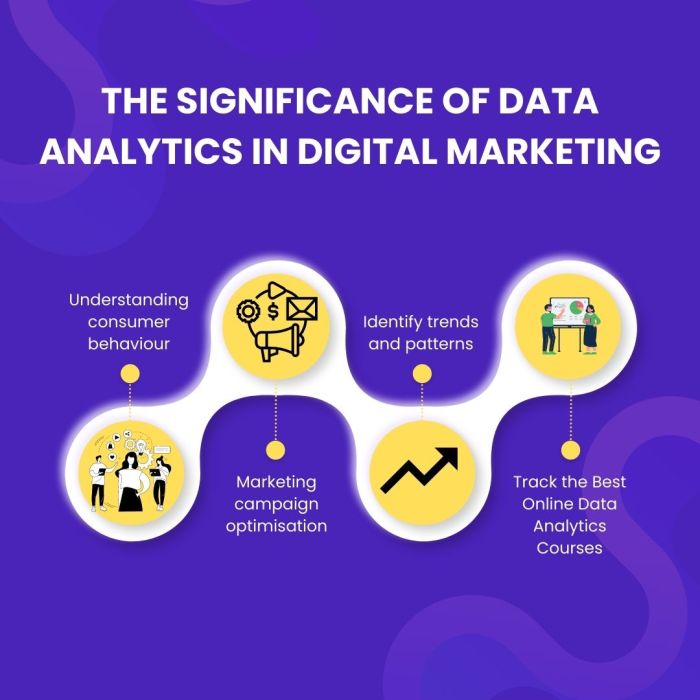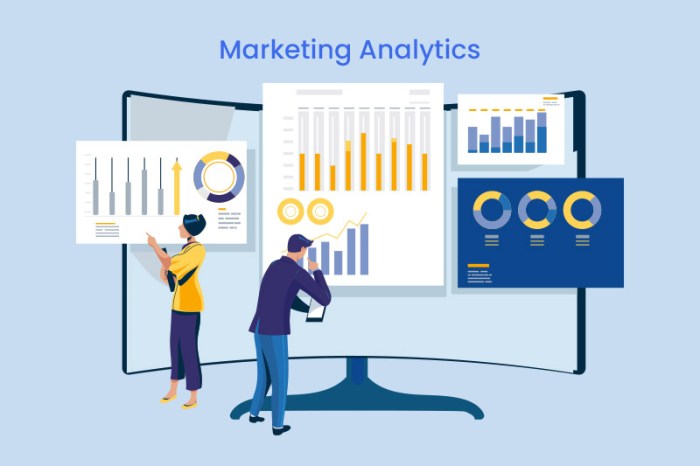Kicking off with Using Data Analytics for Marketing, this opening paragraph is designed to captivate and engage the readers, setting the tone american high school hip style that unfolds with each word.
Data analytics is the key to unlocking the potential of marketing in today’s digital age. By harnessing the power of data, businesses can gain valuable insights into customer behavior, create targeted marketing campaigns, and ultimately drive success. In this fast-paced world of marketing, understanding the importance of data analytics is crucial for staying ahead of the competition. So, let’s dive into the realm of data analytics and discover how it can revolutionize the way we approach marketing strategies.
Importance of Data Analytics in Marketing

Data analytics plays a crucial role in modern marketing strategies, providing valuable insights into customer behavior and preferences. By analyzing data, marketers can tailor their campaigns to target specific audiences effectively.
Understanding Customer Behavior
Data analytics enables marketers to gain a deeper understanding of customer behavior by tracking and analyzing various data points. For example, by analyzing website traffic, social media engagement, and purchase history, marketers can identify trends and patterns that help them understand what drives customer decisions.
Creating Targeted Marketing Campaigns
With data analytics, marketers can create targeted marketing campaigns that resonate with their target audience. By segmenting customers based on their preferences and behaviors, marketers can deliver personalized messaging and offers that are more likely to convert. For instance, e-commerce companies like Amazon use data analytics to recommend products based on customers’ browsing and purchase history, increasing the likelihood of making a sale.
Successful Marketing Strategies Driven by Data Analytics
One of the most well-known examples of successful marketing strategies driven by data analytics is the “Share a Coke” campaign by Coca-Cola. By analyzing data on popular names and consumer preferences, Coca-Cola created personalized bottles with different names, increasing customer engagement and sales. Another example is Netflix, which uses data analytics to recommend personalized content to its users, leading to higher viewer satisfaction and retention rates.
Types of Data Used in Marketing Analytics: Using Data Analytics For Marketing
When it comes to marketing analytics, there are various types of data that are crucial for understanding consumer behavior and shaping effective marketing strategies.
Demographic Data
Demographic data plays a key role in marketing analysis as it provides valuable insights into the characteristics of a target audience. This type of data includes information such as age, gender, income level, education, and geographic location. By analyzing demographic data, marketers can tailor their campaigns to specific segments of the population, ensuring that their messaging resonates with the right people.
- Age: Knowing the age range of your target audience can help you create content that is relevant to their interests and preferences.
- Gender: Understanding the gender distribution of your audience can guide your marketing efforts towards creating more inclusive and diverse campaigns.
- Income Level: Income data can help marketers price their products/services effectively and target the right economic segments.
Social Media Data
In today’s digital age, social media data has become a goldmine for marketers looking to understand consumer behavior and trends. Platforms like Facebook, Instagram, Twitter, and LinkedIn provide valuable insights into how consumers interact with brands online. By analyzing social media data, marketers can track engagement metrics, sentiment analysis, and even predict future trends.
Social media data can reveal valuable information about customer preferences, buying behavior, and brand perception, allowing marketers to fine-tune their strategies for maximum impact.
- Engagement Metrics: Analyzing likes, comments, shares, and click-through rates can help marketers gauge the effectiveness of their social media campaigns.
- Sentiment Analysis: Monitoring consumer sentiment on social media can help brands identify potential issues, address customer concerns, and capitalize on positive feedback.
- Trend Forecasting: By tracking conversations and hashtags, marketers can anticipate upcoming trends and tailor their marketing efforts to stay ahead of the curve.
Tools and Technologies for Marketing Data Analysis
Data analytics tools play a crucial role in helping marketers make informed decisions based on data-driven insights. Let’s explore some of the popular tools and technologies used in marketing data analysis.
Google Analytics
Google Analytics is one of the most widely used tools for tracking and analyzing website traffic. It provides valuable information about user behavior, conversions, and other key metrics. Some features of Google Analytics include:
- Real-time data tracking
- Conversion tracking
- Customizable reports
- Integration with other Google products
Adobe Analytics
Adobe Analytics offers advanced analytics capabilities for marketers looking to dive deep into customer data. Key features of Adobe Analytics include:
- Segmentation tools for targeted analysis
- Predictive analytics for forecasting trends
- Data visualization options for easy interpretation
- Integration with Adobe Marketing Cloud
Data Visualization Tools
Data visualization tools are essential for turning complex marketing data into actionable insights. These tools help marketers present data in a visually appealing and easy-to-understand format. Some popular data visualization tools include:
- Tableau: Allows for interactive dashboards and visualizations
- Power BI: Offers robust data visualization and business intelligence capabilities
- Google Data Studio: Enables the creation of customizable reports and dashboards
- Domo: Provides real-time data visualization and collaboration features
Implementing Data-Driven Marketing Strategies

Data-driven marketing strategies involve utilizing insights from data analytics to create targeted and effective campaigns. By leveraging data, companies can enhance their marketing ROI and better connect with their target audience. However, implementing these strategies comes with its own set of challenges.
Steps in Creating Data-Driven Marketing Campaigns, Using Data Analytics for Marketing
Implementing data-driven marketing campaigns involves several key steps:
- 1. Define Goals: Clearly Artikel the objectives and key performance indicators (KPIs) you want to achieve with your campaign.
- 2. Collect Data: Gather relevant customer data from various sources, including CRM systems, website analytics, and social media platforms.
- 3. Analyze Data: Use data analytics tools to analyze customer behavior, preferences, and interactions to identify patterns and insights.
- 4. Segment Audience: Divide your target audience into specific segments based on demographics, behaviors, or preferences to personalize your marketing messages.
- 5. Develop Campaign: Create tailored marketing campaigns based on the insights gained from data analysis to engage with each audience segment effectively.
- 6. Measure Performance: Track the performance of your campaigns using KPIs and metrics to evaluate their effectiveness and make data-driven adjustments.
Best Practices for Leveraging Data Analytics in Marketing
To improve marketing ROI through data analytics, consider the following best practices:
- 1. Use Predictive Analytics: Predict future trends and customer behavior to proactively adjust your marketing strategies.
- 2. Personalize Content: Tailor your marketing messages and content to match the preferences and interests of different audience segments.
- 3. Test and Iterate: Continuously test different strategies and messages based on data insights, and iterate to optimize your campaigns.
- 4. Invest in Training: Ensure your marketing team has the necessary skills and knowledge to effectively utilize data analytics tools and interpret insights.
Challenges in Implementing Data-Driven Marketing Strategies
Companies may face the following challenges when implementing data-driven marketing strategies:
- 1. Data Quality Issues: Inaccurate or incomplete data can lead to flawed insights and ineffective marketing campaigns.
- 2. Privacy Concerns: Ensuring compliance with data privacy regulations and protecting customer information is crucial in data-driven marketing.
- 3. Integration of Data Sources: Consolidating data from multiple sources and systems can be complex and time-consuming.
- 4. Skill Gaps: Lack of expertise in data analytics and interpretation among marketing teams can hinder the successful implementation of data-driven strategies.
